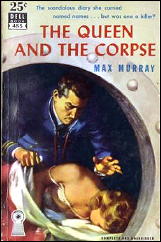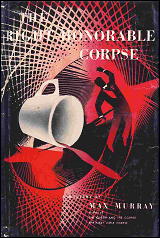Thu 15 Sep 2011
William F. Deeck
MAX MURRAY —

â— The Queen and the Corpse. Farrar Straus, US, hardcover, 1949; Dell #485, mapback edition, no date [1951]. M. Joseph, UK, hardcover, 1960, as No Duty on a Corpse.
â— The Right Honorable Corpse. Farrar Straus, US, hardcover, 1951; Unicorn Mystery Book Club, April, 1951. Collier Books, paperback, 1965. M. Joseph, UK, hardcover, 1952.
In The Queen and the Corpse, on board the luxury liner Queen Alexandra are a group of people with an interest in fellow passenger Leonara Blith, secretary to the late unlamented Felicity Emmabrau. It seems that Blith has with her Emmabrau’s scandalous diary, intended for a New York publisher. But she doesn’t have it long.
Principal among those preoccupied with Blith is Peter Almsford, horse breeder, steeplechase rider, and who knows what all. It is he who at first reluctantly detects and discovers the murderer, sorting out the many red herrings.
Murray does well here, providing humor and good characterization, despite the astounding coincidences. The ending, however, is a disappointment, as is Almsford’s and the villain’s belief that a wife can’t testify against her husband.
Give this one a try anyhow; maybe you’re not the nitpicking type.

With a moderately interesting lead character, Martin Gilbert, pianist to the elite and spy for the Commonwealth of Australia, The Right Honorable Corpse has its moments. While Gilbert is playing the accompanying music, the Minister for Internal Resources, quite competent but generally loathed and feared, drinks some poisoned tea and expires.
Although Gilbert is supposed to work under his music cover, he begins giving people — at least the more intelligent ones — the impression that he is not just a handsome face and talented fingers and that underneath his cynicism and apparently blackmailing ways is a chap with the heart of a little boy.
If you like antiheroes or Australian settings, this novel may appeal. Otherwise, there’s not a great deal here.
An uneven writer, Murray, or maybe an uneven reader, Deeck. Murray’s The Voice of the Corpse I read with great appreciation. Good Luck to the Corpse and The Neat Little Corpse I couldn’t read at all. Although I finished The Doctor and the Corpse, it was a struggle.
Editorial Comment: Included in my own review of The Right Honourable Corpse, which I appear to have liked measurably better than did Bill, is a complete listing of Max Murray’s detective novels, plus some small pieces of information about him personally.
September 15th, 2011 at 10:59 pm
I don’t know about other parts of the world, but for the US I found this relevant information on Wikipedia:
“The spousal testimonial privilege (or spousal immunity) can be used to prevent any party in a criminal case from calling the defendant’s spouse to testify against the defendant about any topic. In federal court as a matter of common law, this privilege attaches to the witness spouse, not to the defendant; that is, the defendant’s spouse can refuse to testify against the defendant, but the defendant may not prevent his or her spouse from testifying against the defendant.”